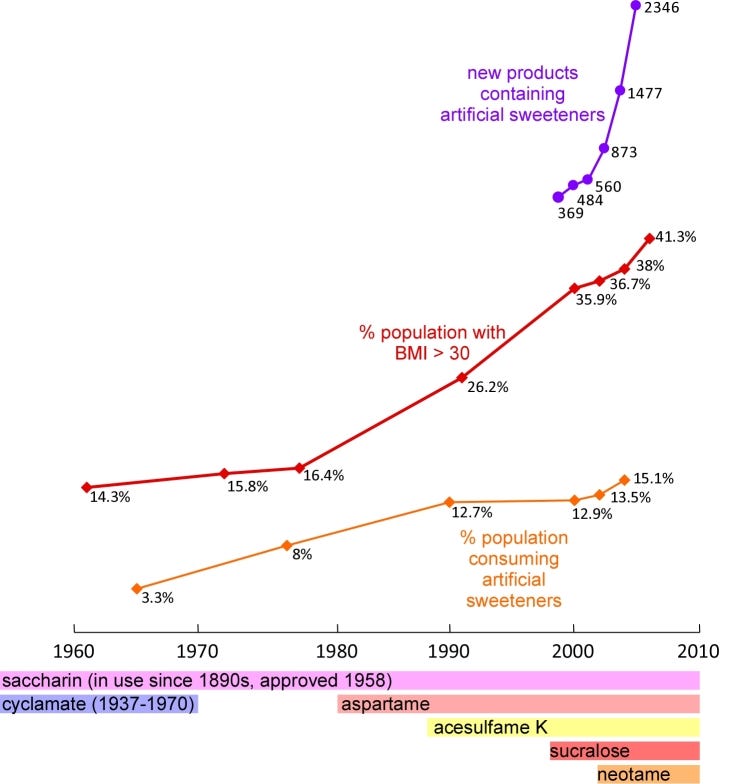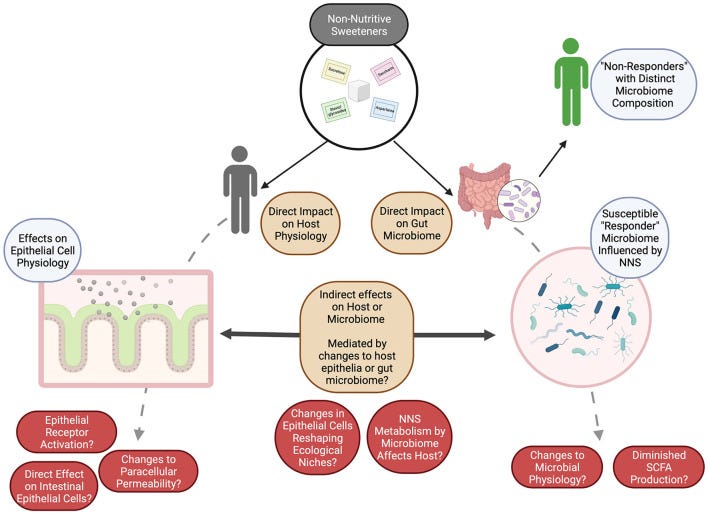103 | Artificial Sweeteners Safety (Everything You Need to Know)
Plus juicy gossip about mushroom poisoning and how to pop corn with a hair straightener
This is The Rotten Apple, an inside view of food integrity for professionals, policy-makers and purveyors. Subscribe for weekly insights, latest news and emerging trends in food safety, food authenticity and sustainable supply chains.
Trends this month: mushroom poisonings
Sweetener safety (everything you need to know)
Food safety news and resources from around the globe
A cyber-threat sharing intelligence network for food and ag
How to pop corn with a hair straightener (just for fun)
Food fraud news and incidents
🎧 Listen Now (for paying subscribers) 🎧
Hi everyone,
I got a lovely note from a subscriber the other day.
"Thank you for providing objective information in a concise format which enables me to stay abreast of situations and trends without spending hours researching. I appreciate your efforts in assisting those of us in the trenches of the Food Safety/Food Fraud landscape."
Love this! Thank you to Karina, Amy, Jeffrey for signing up to paid subscriptions, and to Andrew and Leanne for your ongoing trust in my work 👏.
This week’s issue has a feisty granny popping corn with a hair straightener, juicy gossip about the Aussie mushroom poisoning (is it murder?) and a deep dive into the safety of sweeteners, as well as a new initiative to protect food businesses from cyberattacks. Plus all the usual goodies.
Hope you enjoy reading it as much as I enjoyed putting it together for you.
Karen
P.S. If you haven’t become a paid subscriber yet, now’s the time. Your subscription supports independent ad-free goodness (and it’s probably tax deductible for you!)
Cover image: Brett Jordan on Unsplash
Trends this Month: Mushroom Poisoning
This month, Australia, France and Guatemala have all reported deaths (14 in total) from wild mushroom poisoning.
Guatemala recorded 19 poisonings with 9 deaths (source), Australia had 3 deaths (source) and France reported on total cases for 2022, with a total of 2 deaths from 1,923 poisonings.
“Risk factors for [mushroom] poisoning are poor conservation, consumption of old mushrooms in poor condition, undercooked mushrooms or eating too many, and personal sensitivity, but the major risk is confusing an edible species with a toxic one.” Food Safety News, reporting on France’s statistics
Mushroom poisoning (Australia): The plot thickens
There have been allegations that the recent mushroom poisoning deaths in Australia were not accidental. The woman who cooked the poisonous dish for the parents of her ex-husband and two other victims, claims she only used store-bought mushrooms, including fresh button mushrooms from the supermarket and dried mushrooms from an Asian grocer. She did not eat any of the food.
She has also publicly confirmed that she took a food dehydrator to a local rubbish tip (dump) after her ex-husband said “Is that [the dehydrator] what you used to poison them?” (source).
Chinese mushroom deaths
Fungi, mainly poisonous mushrooms, are the most frequently implicated food type in household foodborne illness outbreaks in China. A recently published report about the occurrence and types of household foodborne disease outbreaks revealed that fungi accounted for almost half of all household outbreaks and caused 31,125 illnesses and 736 deaths in the ten years between 2010 and 2020.
Confused About Sweetener Safety?
Here’s everything you need to know
Last month, the World Health Organization (WHO) announced that its cancer research agency (IARC) had classified aspartame as a possible human carcinogen while simultaneously reporting that its food additives committee (JECFA) had confirmed it is safe to still consume up to 40 mg/kg of body weight per day of aspartame. JECFA has reviewed aspartame’s safety three times and IARC only once.
Before the IARC report was released, WHO issued new dietary guidelines recommending that people should not use non-nutritive sweeteners like aspartame to control body weight or reduce the risk of noncommunicable diseases such as heart disease or diabetes.
WHO says the evidence suggests that the long-term consumption of non-nutritive sweeteners does not help people to lose weight and may cause undesirable outcomes like an increased risk of type 2 diabetes and cardiovascular diseases.
So is aspartame safe or not? Well (as usual), it depends….
A consumer advocacy group says the conflicting information coming from WHO is partly the result of conflicts of interest for people in the food additives committee. More on that later.
What are non-nutritive sweeteners?
Non-nutritive sweeteners are compounds that have an intensely sweet taste with no or very few calories compared to white sugar. They are 300 to 13,000 times sweeter than sucrose (ordinary ‘sugar’). They include both artificial sweeteners and sweeteners derived from natural sources such as plants.
Common artificial sweeteners are saccharin, aspartame, sucralose, neotame, acesulfame-K, alitame and cyclamate.
The most common natural non-nutritive sweeteners are monk fruit extract (also known as Swingle fruit extract or Luo Han Guo), derived from the fruit of a vine native to Southern China (Siraitia grosvenorii); and stevia (steviol glycosides), derived from the leaves of the plant Stevia rebaudiana or by biotechnological methods using genetically modified microorganisms.
Sugar alcohols (polyols) are not considered non-nutritive sweeteners because they have some calories and are less sweet than both artificial sweeteners and regular sugar.

Why eat food with non-nutritive sweeteners?
The accepted wisdom for choosing to eat foods containing non-nutritive sweeteners is that they are a good way to reduce sugar and calorie consumption without sacrificing taste.
Fun facts about the discovery of non-nutritive sweeteners (don’t try this at home kids!)
Bad lab practices were responsible for the discovery of both aspartame and cyclamate. Aspartame was discovered when a chemist making a synthetic peptide for use in the study of developmental gastric-ulcer drugs accidentally contaminated his own hand with an intermediate chemical, without realising it. When he licked his hand he discovered its intensely sweet flavour (source).
The inventor of cyclamate told the New York Times he brushed his lips after working in the chemistry lab without washing his hands and found his fingers tasted sweet. He then tasted every chemical he had worked on that day to find the compound that had the sweet taste. (source) Another less reliable source claims he discovered the sweet taste after smoking a cigarette that had been resting on his lab bench (so many things wrong about all of this!)
Which sweeteners have safety concerns?
Many artificial sweeteners have been the subject of safety controversies. For example, cyclamate was widely used in the United States in the 1950s and 1960s, gaining GRAS status (generally recognised as safe) before being abruptly banned in 1970 due to cancer fears after a rodent study. It was similarly banned in other countries, with many bans later overturned when other studies failed to replicate the results.
Saccharin, discovered in 1879, is the oldest artificial sweetener and was considered GRAS for two decades before being linked to bladder cancer in the 1970s. The US FDA attempted to ban it in 1977, but was being thwarted by “avid consumer protests”. The bladder cancer link was later shown to be specific to rodent physiology.
After cyclamate, which is allowed in more than 50 countries but banned in the USA, aspartame is perhaps the most controversial non-nutritive sweetener.
Aspartame was first approved as a sugar replacement in 1981 and is used in a variety of foods and medications. It is generally considered safe when consumed occasionally and in small amounts, except for people with phenylketonuria, a rare genetic disorder, who can be seriously harmed by consuming even small quantities.
Aspartame has been the subject of much safety-related research since the 2000s. In 2007 researchers demonstrated an increase in certain cancers in rats that were fed doses approximately similar to the US acceptable daily intake of aspartame over long periods. At around the same it was linked to migraines in some individuals.
Many other studies have followed, and these were reviewed by both the IARC and JEFCA for the recently published WHO report on the health impacts of aspartame.
Do non-nutritive sweeteners work?
Since most people in wealthy countries eat too much sugar - Americans consume more than double the amount recommended by the US FDA and four times the amount recommended by the World Health Organisation - and WHO’s food additives committee (JEFCA) says non-nutritive sweeteners are safe in moderation, there must be benefits to using them, right?
Actually, there’s not much evidence that they work. They have even been linked to weight gain. For example, a long-term study of 3,682 adults in the 1980s found that people who drank artificially sweetened beverages put on weight over the course of the seven to eight-year study period compared to people who didn’t.
In fact, those people who consumed more than 21 artificially sweetened beverages per week almost doubled their risk of becoming overweight or obese compared to non-users. Saccharin intake was similarly linked to weight gain over 8 years in a study of 31,940 women in the 1970s.
More recently, a 2022 study showed that glycemic response is impaired in healthy people who consume sucralose and saccharin, possibly because of its impacts on the gut microbiome (source).
Interestingly, when obese patients in a metabolic ward were given sugar-containing foods and beverages in place of aspartame-containing equivalents without their knowledge, the patients immediately ate less, achieving a 25 percent reduction in their total energy intake (source).
In another study, people who had been fed non-nutritive sweeteners – especially aspartame - were more motivated to eat more foods than those who were not. Rats showed the same effects with saccharin pre-feeding before a ‘normal’ meal (source).
Yet another study showed that people who consumed diet soda at least once per day had a 36% greater risk of experiencing certain aspects of metabolic syndrome (overweight) and a 67% greater risk of type 2 diabetes compared to people who were otherwise similar but who did not drink them. (Note that this does not prove that the diet soda caused the diseases).

Do non-nutritive sweeteners cause heart disease?
A 2022 study of 100,000 adults in France showed a link between artificial sweeteners and heart disease and stroke. Participants in the study who consumed large amounts of aspartame had a higher risk of stroke than people who didn’t consume the sweetener. Consumers of sucralose and acesulfame potassium had a higher risk of heart disease. As above, this is not proof of causation but demonstrates a link.
Non-nutritive sweeteners and the gut microbiome
With advances in technology and our understanding of the human microbiome, scientists have recently turned their attention to the effects of non-nutritive sweeteners on microorganisms in the human gut.
In one such study, people who consumed six sachets of artificial sweeteners per day, which is within the US FDA’s acceptable intake, of either aspartame, saccharin, stevia or sucralose, experienced measurable changes to their gut microbiomes after two weeks. People in the control group who did not consume the non-nutritive sweeteners did not have changes.
The changes observed for people who had been given daily doses of sucralose and saccharin impacted their bodies’ ability to handle glucose. When gut microbiome samples from affected people were transferred to mice, the mice also experienced blood sugar alterations (source).

Other studies show different effects on human gut microbiomes, with a review of recent research concluding:
“Collectively… these studies suggest that not only is the gut microbiome affected by the consumption of non-nutritive sweeteners, but that these impacts on the gut microbiome have physiological consequences for the host” (source).
Controversies due to commercial conflicts?
The conflict between WHO’s agencies, with the IARC saying aspartame is a possible carcinogen, the WHO nutrition committee saying non-nutritive sweeteners should be avoided and the food additives committee (JEFCA) saying aspartame is fine to consume at levels up to 9 - 14 cans of diet soda per day, has been attributed to commercial pressures from industry, by advocacy group U.S. Right to Know.
According to the group, around half of the JEFCA expert panel that made the decision to maintain the status quo for aspartame, including the panel’s chair and vice chair, have ties to ILSI (International Life Sciences Institute).
ILSI, an industry-funded charity, has previously been accused of promoting its agenda to regulatory authorities with the aim of shaping international policy and law. US Right to Know says ILSI is a “front” for big companies such as Coca-Cola, that have a vested interest in shaping decisions about food additives.
Aspartame is the sweetener in Diet Coke, the world’s most popular diet soda.
What to do with this information
As a food company employee
There are technical benefits to formulating foods with non-nutritive sweeteners, however, consumers’ health may not benefit from foods containing non-nutritive sweeteners.
Consumer perceptions of the safety of sweeteners such as aspartame could negatively impact their desire to buy such foods.
The regulatory status of aspartame seems safe for now, but that may change.
As a consumer
The purported benefits of consuming non-nutritive sweeteners are poorly supported by scientific evidence. Rather than contributing to weight loss and protecting glucose response in people with type 2 diabetes, they may have the opposite effects.
However, it is not a good idea to replace foods containing non-nutritive sweeteners foods with high-sugar foods.
The World Health Organisation recommends consumers avoid non-nutritive sweeteners and also reduce the sweetness of their overall diet, consuming food with naturally occurring sugars, like fruit, and unsweetened food and beverages, instead of food with free (added) sugars.
In short: 🍏 Conflicting reports on the safety of aspartame, a non-nutritive sweetener, have been released by agencies in the World Health Organization 🍏 Artificial non-nutritive sweeteners have been linked to negative health outcomes in animal studies and human studies over many decades 🍏 New research has shown that the consumption of non-nutritive sweeteners alters human gut microbiomes 🍏 Consuming non-nutritive-sweetener-containing foods can lead to weight gain 🍏 There have been suggestions that panel members of the WHO agency which claims consumption of aspartame is safe have a conflict of interest because of their association with an industry-funded charity 🍏
Learn more: 🍏 WHO Evaluation of Aspartame 🍏 WHO recommendations for non-sugar sweeteners 🍏
Food Safety News and Resources
28th August | Food Safety News and Free Resources | Dirty ice cream machines kill 3 people | High bromate in bottled water (USA) | 600 affected by food poisoning (Finland) | Energy drinks with pharmaceutically active components recalled (Canada) | 300 diners infected by one restaurant worker (USA) |
Cyberthreats: Information sharing for food and ag companies
A cyber attack in 2022 cost Dole (an American food giant) $10.5 million according to the company’s earnings report published in Feb 2023. The attack took the form of a ransomware activation, which shut down Dole’s IT systems.
Now, the Information Technology-Information Sharing and Analysis Center, a not-for-profit organisation that tracks threats from cyber attacks across multiple industries, has announced it will create a specialist group to serve food and agriculture businesses.
Other sectors, such as automotive and financial services already had special groups which allow them to share details of cyber threats and cyber attacks with their peers.
Learn more: Food Producers Band Together in Face of Cyber Threats - WSJ
How to Pop Popcorn with a Hair Straightener
This 33 second video features a feisty granny taking a scientific approach to popping corn using various methods, including a hair straightener and a blow torch. (Totally safe for work!)
 Tiktok failed to load.
Tiktok failed to load.Enable 3rd party cookies or use another browser
What you missed in last week’s email
Recording! 🍏 Food Safety Culture - Best Practices and Resources (60 minute video)
Past issues e-book out now
Bill Marler’s magic wand (let’s banish Hep A)
From the Duh Files: putting allergenic proteins into plant foods is dumb
Is ocean wine unsafe or just weird?
Below for paying subscribers: Food fraud news and incident reports (audio 🎧 is now at the top of the page)
📌 Food Fraud News 📌
Food fraud in GFSI systems celebrates 10 years
It’s been a journey! Ten years ago, the Global Food Safety Initiative decided to treat food fraud as a specific issue within food safety. Their Food Fraud Think Tank recommended



